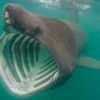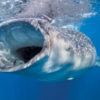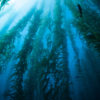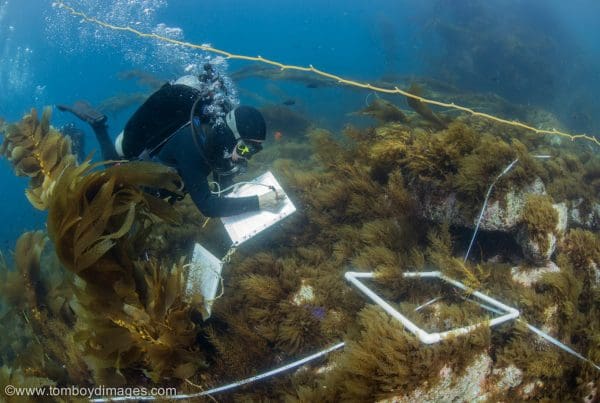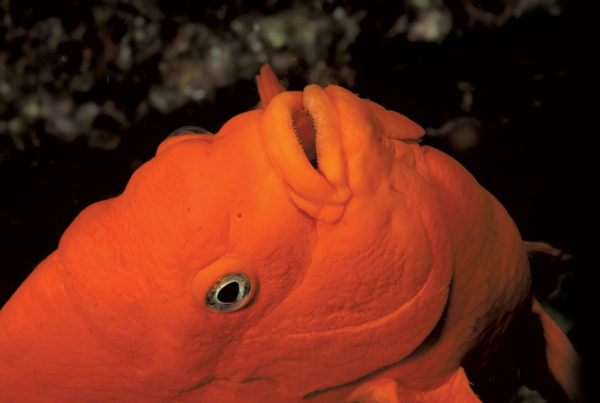And the controversy over the ethics of fish feeding rages… Florida has now banned fish feeding. Does it artificially alter fish behavior? Does it have a negative impact on the environment? Whatever side you take, it is nice to know that there are ways other than fish feeding to attract and hold the attention of fish.
RUBBING ROCKS TOGETHER
Many species of reef fish are very sensitive to noises near them because it tells them feeding activity is in progress. Many fish feed by breaking up reef creatures like snails, urchins, and crabs with powerful jaws. They also scrape food animals from the rock. Noises mean food is around and they want to be part of the party, even if it is only to get crumbs. Rubbing or banging rocks together will attract garibaldi, señoritas, rock wrasse, and especially sheephead. As a matter of fact, I have found that rubbing rocks together is the best way to attract close in large male sheephead, better than food itself.
OTHER NOISES
Other California fish react to noises underwater. Snap your fingers underwater and watch garibaldi stand up and notice. Garibaldi are territorial and will confront intruders with a popping in their throats. Snapping your finders will imitate this noise, making the garibaldi think you are challenging their territory. This is especially useful if coupled with the use of an orange glove (more on that later).
Spearfishers have long used the technique of “strumming” the bands on their spearguns to attract yellowtail. Yellowtail are very curious fish but often difficult to draw in close. This is a very effective technique.
“SQUIDDING” AND OTHER HAND MOVEMENTS
Another effective technique for attracting yellowtails is something known as “squidding.” A diver motions with his hand imitating the movement of a squid or octopus underwater. This is especially effective for use by free-divers. It will also work on other large predatory fish such as calico bass and barracuda.
Other hand movements can be used to get the attention of fish, depending on the particular species. A rapid flipping of the hand will get the attention of nearly any predatory fish. These motions imitate a fish in distress. It works with calico bass, yellowtail, and occasionally sheephead.
A hand clad in an orange garden glove can be used to imitate the confrontational behavior of a garibaldi. Hold your fingers together to make the shape of a fish. Pointing the fingers down at a 45-degree angle, twitch the hand. Odds are, another garibaldi will confront the hand in the same posture.
MIRRORS
Territorial fish will confront fish of their own species with vigor, even if that is a mysterious image in a mirror. Sarcastic fringehead blennies, common on deep sand flats such as submarine canyons, exhibit fascinating behavior patters when confronted with their own image. Although only a small fish, about six inches long, they are fiercely territorial. Confronted by an intruder, the fringehead will expand its jaw wide, enlarging the size of its face greatly and flare its back fin, exhibiting a bright blue dot on this otherwise dull colored fish.
We’ve by now established that garibaldi are territorial. And a mirror will further enforce that point. Keep in mind that the garibaldi’s territorial bent is best demonstrated during its nesting season of spring through early fall.
Sheephead will also occasional fall for the mirror trick, as will lingcod. Some rockfish are territorial as well, especially the yellow and black striped treefish.
Getting a mirror underwater safely is no easy task. Your best option is to use a plastic or metal camping mirror available at most sporting goods stores.
Regardless of your feelings on the ethics of fish feeding, there are some disadvantages that must be mentioned. First, why kill one marine animal to feed another (actually, they do that pretty good on their own). Second, it puts a lot of crud in the water that can mess up photography. And finally, whenever food is involved, there is the risk of getting bit.
Attracting fish with alternate techniques can not only lead to better photos, but fish watching in general.



